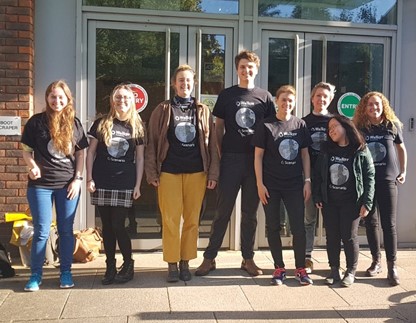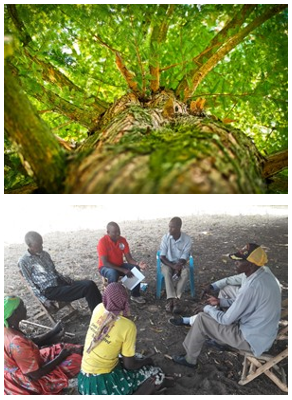Despite the challenges caused by the pandemic, and not being able to meet so many valued colleagues and partners in person, the Walker Institute team have continued to build our body of work: strengthening longstanding, and forging new, relationships around the world. Mirroring the twelve days of Christmas we’ve picked our twelve highlights of 2021 – the twelve months of Walker! We hope it’s an enjoyable read and wish you all a healthy and peaceful break.

1. A new collaboration with, and generous support from, Microsoft UK will help Walker Institute scientists develop more solutions to climate threats worldwide, increasing our capacity to undertake essential and impactful work. To celebrate, we held a lively launch event including an expert panel discussion that reflected on COP26 and how technology and private public partnerships can tackle climate crisis challenges.
2. Ten representatives of the University of Reading attended COP26 in-person, led by Walker Institute Director Prof Ros Cornforth. You can find a full list of the events that the Walker Institute took part in, along with the wide array of partners involved here. The COP Climate Action Studio (COPCAS) was again a great success this year – students from the SCENARIO doctoral training centre reported and blogged on events as they unfolded at COP26, both in-person in Glasgow and from ‘the studio’ in Reading.

3. Walker contributed to a chapter on uncertainty and the use of decision-driven approaches in East Africa in the OECD report on Managing Climate Risks, Facing up to Losses and Damages launched at COP26. In Chapter four, we examine approaches to decision-making under uncertainty, with a case study focusing on the agricultural sector in Uganda. This is followed by a discussion of approaches to address the drivers of climate risks (hazards, exposure and vulnerability) with regards to livelihoods and well-being. Our team included Dr. Lindsay Todman from SAPD and Prof. Ted Shepherd from SMPCS.
4. The final data collection for the NIMFRU flood resilience project was completed. Led by our on-the-ground partner ECOTRUST, in-depth interviews were conducted with community members and district officers in Katakwi, Uganda. These interviews will allow us to better understand the impact that the NIMFRU project has had on the lives of local people, assess how the project’s findings have been used to improve district policies and processes, and identify areas that need further research and development.
5. The Walker Academy ran the Assessing Livelihood Vulnerability to Extreme Shocks (ALiVE) course. The course, which was run in partnership with Evidence for Development, provided an introduction to the Household Economy Approach and Individual Household Method, both used to analyse the resilience of rural livelihoods to climate shocks for students from the UK, Uganda and Kenya.
6. Voted the best new metric using non-traditional observations, a Walker Institute / University of Reading project ‘Semi-quantitative information on flood impact for verification of flood events: Case study of Uganda’, was selected as the winner of a World Meteorological Organization (WMO) Challenge Competition. The flood warnings it informs can be the difference between life and death for thousands of people caught in the path of an approaching flood and used to inform decisions to protect livelihoods.
7. We are delighted that Dr Aida Opoku-Mensah joined the Walker Institute as a new Board member. She brings substantial knowledge and a formidable network of contacts to help steer and develop our climate adaptation research work with colleagues in Africa and elsewhere. Dr Opoku-Mensah was, until recently, Chief of Staff at United Nations Economic Commission for Africa (UNECA). Read an interview with Aida by our COPCAS students here.
8. Walker Institute Director, Prof Ros Cornforth, presented at the Sustainability Research & Innovation Congress 2021. She spoke about the World Climate Research Programme’s ‘My Climate Risk’ lighthouse activity, which is co-chaired by University of Reading’s Prof Ted Shepherd. Ros discussed the need for climate scientists to foster long-term, interdisciplinary partnerships to allow climate risk assessments to begin from a detailed understanding of the ‘vulnerability first’ local context rather than the ‘predict then act’ model.
9. The Walker Institute team has started work on a multi-partner project with Syngenta Foundation for Sustainable Agriculture, entitled ‘Boosting Agriculture Risk Mitigation in Bangladesh Through Climate Index Insurance for Smallholders.’ The work includes the development of a methodology of analysis to test the effectiveness of an insurance product in protecting people and capacity building through the Walker Academy which will provide farmer and actuary training schools on climate resilience that will be embedded in local institutions. The project is co-funded by InsuResilience Solutions Fund.
10. A new NERC-funded Global Seedcorn partnerships project, Treetops aims to establish a collaborative, interdisciplinary partnership between leading researchers from Uganda (Makerere University and EcoTrust) and the UK in climate, forest and livelihoods research. The research includes an assessment of the resilience of different Forestry Landscape Restoration approaches to climate impacts in Masindi, Uganda an area which, despite a focus on ‘nature based solutions’ to the climate emergency, has received very little attention.

11. In partnership with the UN Environment Programme and Wood plc, we have been leading on the development of climate risk assessments in Iraq to build local adaptive capacity whilst contributing to the mainstreaming of regional and national adaptation efforts and an appreciation of climate change risks. This research is part of a larger programme to support the implementation of National Adaptation Plans for several countries across Asia-Pacific. It involves modelling the possible impacts of different climate change scenarios for a range of sectors and ecosystems. Capacity building is an essential element to help each country develop fully functional climate services.
12. At the Walker Institute, we have a strong team ethic which has continued successfully through the challenges of the pandemic. In recent months we have welcomed new members including researchers Elena Saggioro and Will Shears, and operational team members Gerard Stewart, Marah McGuire and Konstantina Pratta. You can meet our core team here.
Gerard Stewart is Knowledge Management Officer at the Walker Institute.
